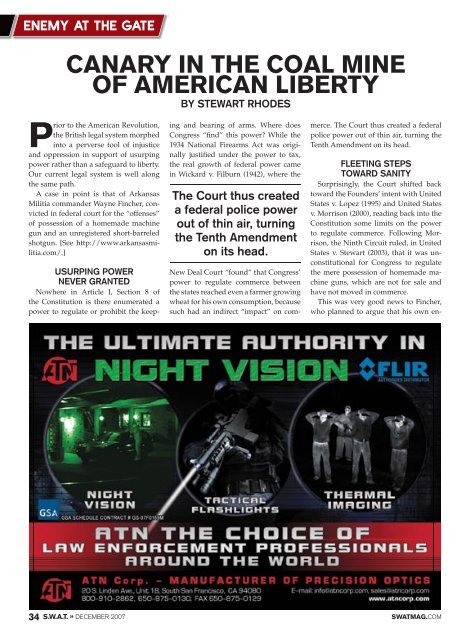S.W.A.T. December 2007 - McKeesport Police Department
S.W.A.T. December 2007 - McKeesport Police Department
S.W.A.T. December 2007 - McKeesport Police Department
You also want an ePaper? Increase the reach of your titles
YUMPU automatically turns print PDFs into web optimized ePapers that Google loves.
ENEMY AT THE GATE<br />
CANARY IN THE COAL MINE<br />
OF AMERICAN LIBERTY<br />
BY STEWART RHODES<br />
Prior to the American Revolution,<br />
the British legal system morphed<br />
into a perverse tool of injustice<br />
and oppression in support of usurping<br />
power rather than a safeguard to liberty.<br />
Our current legal system is well along<br />
the same path.<br />
A case in point is that of Arkansas<br />
Militia commander Wayne Fincher, convicted<br />
in federal court for the “offenses”<br />
of possession of a homemade machine<br />
gun and an unregistered short-barreled<br />
shotgun. [See http://www.arkansasmilitia.com/.]<br />
USURPING POWER<br />
NEVER GRANTED<br />
Nowhere in Article I, Section 8 of<br />
the Constitution is there enumerated a<br />
power to regulate or prohibit the keep-<br />
ing and bearing of arms. Where does<br />
Congress “fi nd” this power? While the<br />
1934 National Firearms Act was originally<br />
justifi ed under the power to tax,<br />
the real growth of federal power came<br />
in Wickard v. Filburn (1942), where the<br />
The Court thus created<br />
a federal police power<br />
out of thin air, turning<br />
the Tenth Amendment<br />
on its head.<br />
New Deal Court “found” that Congress’<br />
power to regulate commerce between<br />
the states reached even a farmer growing<br />
wheat for his own consumption, because<br />
such had an indirect “impact” on com-<br />
merce. The Court thus created a federal<br />
police power out of thin air, turning the<br />
Tenth Amendment on its head.<br />
FLEETING STEPS<br />
TOWARD SANITY<br />
Surprisingly, the Court shifted back<br />
toward the Founders’ intent with United<br />
States v. Lopez (1995) and United States<br />
v. Morrison (2000), reading back into the<br />
Constitution some limits on the power<br />
to regulate commerce. Following Morrison,<br />
the Ninth Circuit ruled, in United<br />
States v. Stewart (2003), that it was unconstitutional<br />
for Congress to regulate<br />
the mere possession of homemade machine<br />
guns, which are not for sale and<br />
have not moved in commerce.<br />
This was very good news to Fincher,<br />
who planned to argue that his own en-<br />
34 S.W.A.T. » DECEMBER <strong>2007</strong> SWATMAG.COM


